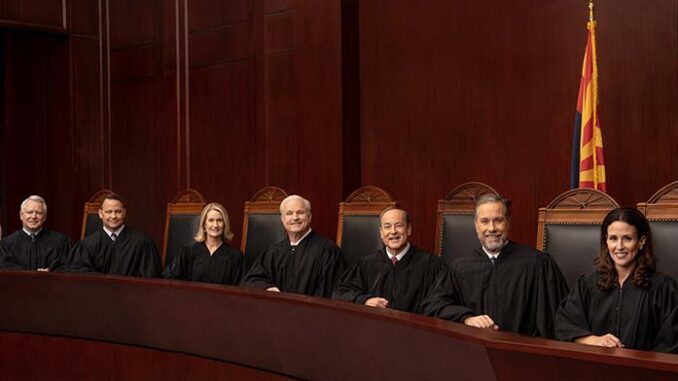
A Tuesday order from the Arizona Supreme Court would all but prevent challenges to presidential elections, per Arizona’s former assistant attorney general Jen Wright.
The administrative order requires trial court judges to prioritize election cases and issue final judgments promptly to assist with appellate review. The court order also gave a deadline for appeals relating to presidential elector contests: 1 p.m. on Dec. 6, 2024, several days after certification.
Wright explained that the order was more than just a restatement of existing law in an interview with James T. Harris on the “Conservative Circus” on Wednesday.
“It effectively voids state law by judicial fiat,” said Wright.
Former Arizona Assistant AG Jennifer Wright talks AZ Supreme Court Administ | News Talk 550 KFYI | The Conservative Circus w/ James T. Harris https://t.co/dfrSCMci1R pic.twitter.com/caKZsha138
— NewsTalk 550 KFYI (@KFYI) October 16, 2024
In the administrative order, Chief Justice Ann Scott Timmer stated that justice could only be attained through prioritizing post-election judicial proceedings and tasks concerning recounts.
“Arizona law requires that judgment be pronounced by the superior court in election contests on an accelerated basis,” said Timmer. “Giving judicial priority to such statutory proceedings is of heightened importance in a presidential election [under the U.S. Constitution.]”
Wright said that Timmer’s order “constrains” contesting presidential election contests by “judicial fiat” through “void[ing] Arizona elections contest statute.” Wright said that any challenges to the presidential election will be “basically impossible” due to that December 6 deadline.
“Basically if there are any concerns about the presidential race, basically an election contest is almost completely eliminated,” said Wright. “However, for the presidential election contest, this executive order specifically states that a decision must be rendered no later than one pm December 6 — that’s four days later. Basically, if there’s any issues with the presidential race […] it has to be done on the second, and a trial would have to occur on the fourth or fifth.”
A candidate cannot bring an election contest until after the statewide certification (November 25). Hamadeh faced issues with his challenge of his race in 2022, since he brought his contest before certification.
Wright also noted that the order declined to address governmental handling of election-related evidence, citing the fact that Hamadeh’s case remains pending on appeal before the Arizona Supreme Court since May and fully briefed since the summer.
“Nothing in this administrative order addresses the evidentiary issues,” said Wright. “At this rate, the election contest can’t be done until the second, and then they’re going to delay any release of any information like they did in Abe Hamadeh’s case.”
Wright said that this restricted timeline “basically eliminated all due process” for election contests.
Wright urged the Arizona Republican Party or lawmakers should immediately file a direct action to challenge the Arizona Supreme Court administrative order, and to be prepared to appeal to the U.S. Supreme Court if necessary.
Unlike the former assistant attorney general, Secretary of State Adrian Fontes declined to find any fault in his public statement on the ruling.
“This administrative order is a proactive step to ensure that our elections process remains unimpeded by unnecessary delays,” said Fontes. “The Supreme Court has effectively set a precedent that escalates resolution of cases involving our presidential electors.”

